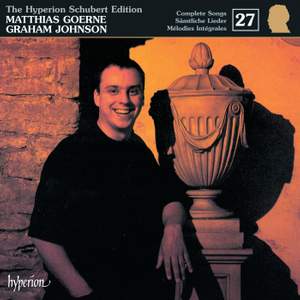The Hyperion Schubert Edition - Complete Songs Volume 27
Schubert and the Schlegels
Matthias Goerne (baritone), *Christine Schäfer (soprano), Graham Johnson (piano)
Goerne's brief is Schubert's settings of the brothers Schlegel, whose volatile character and life are amply and fascinatingly described in Johnson's introduction to the booklet. As ever in this... — More…
Downloads
What are FLAC and MP3?Contents
Schubert: Lob der Tränen D711 (Schlegel)
- Matthias Goerne (baritone), Graham Johnson (piano)
Schubert: Lebensmelodien D395 (A W von Schlegel)
- Matthias Goerne (baritone), Graham Johnson (piano)
Schubert: Sprache der Liebe D410 (A W von Schlegel)
- Matthias Goerne (baritone), Graham Johnson (piano)
Schubert: Wiedersehn D855 (A W von Schlegel)
- Matthias Goerne (baritone), Graham Johnson (piano)
Schubert: Sonett I D628 (Petrarch / A W von Schlegel)
- Matthias Goerne (baritone), Graham Johnson (piano)
Schubert: Sonett II D629 (Petrarch / A W von Schlegel)
- Matthias Goerne (baritone), Graham Johnson (piano)
Schubert: Sonett III D630 (Petrarch / J D Gries)
- Matthias Goerne (baritone), Graham Johnson (piano)
Schubert: Abendröte, D690
- Matthias Goerne (baritone), Graham Johnson (piano)
Schubert: Die Berge, D634
- Matthias Goerne (baritone), Graham Johnson (piano)
Schubert: Die Vogel D691
- Matthias Goerne (baritone), Graham Johnson (piano)





